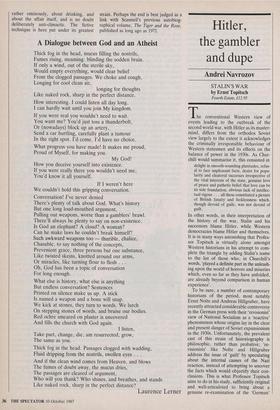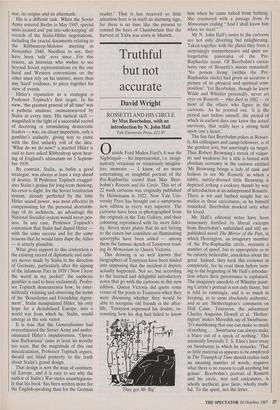Hitler, the gambler and dupe
Andrei Navrozov
STALIN'S WAR by Ernst Topitsch
Fourth Estate, £12.95
he conventional Western view of events leading to the outbreak of the second world war, with Hitler as its master- mind, differs from the orthodox Soviet view largely to the extent it acknowledges the criminally irresponsible behaviour of Western statesmen and its effects on the balance of power in the 1930s. As Chur- chill would summarise it, this consisted in delight in smooth-sounding platitudes, refus- al to face unpleasant facts, desire for popu- larity and electoral successes irrespective of the vital interests of the state, genuine love of peace and pathetic belief that love can be its sole foundation, obvious lack of intellec- tual vigour. . . all these constituted a picture of British fatuity and fecklessness which, though devoid of guile, was not devoid of guilt.
In other words, in their interpretation of the history of the war, Stalin and his successors blame Hitler, while Western democracies blame Hitler and themselves. It is in many ways astonishing that Profes- sor Topitsch is virtually alone amongst Western historians in his attempt to com- plete the triangle by adding Stalin's name to the list of those who, in Churchill's words, `played a definite part in the unleash- ing upon the world of horrors and miseries which, even so far as they have unfolded, are already beyond comparison in human experience'.
To be sure, a number of contemporary historians of the period, most notably Ernst Nolte and Andreas Hillgruber, have recently attracted considerable controversy in the German press with their `revisionist' view of National Socialism as a `reactive' phenomenon whose origins lay in the clear and present danger of Soviet expansionism in the 1930s. Unfortunately, the prevalent cast of this strain of historiography is philosophic, rather than probative; `re- visionists' like Nolte and Hillgruber address the issue of `guilt' by speculating about the internal causes of the Nazi reaction, instead of attempting to uncover the facts which would objectify their con- clusions. This is what Professor Topitsch aims to do in his study, sufficiently original and well-articulated to bring about a genuine re-examination of the 'German' war, its origins and its aftermath.
His is a difficult task. When the Soviet Army entered Berlin in May 1945, special units located and `put into safe-keeping' all records of the Stalin-Hitler negotiations, including the crucial documents relating to the Ribbentrop-Molotov meeting in November 1940. Needless to say, they have been 'safe' ever since. For this reason, an historian who wishes to see beyond Soviet representations on the one hand and Western conventions on the other must rely on his instinct, more than any 'hard' evidence, to piece together his view of events.
Hitler's reputation as a strategist is Professor Topitsch's first target. In his view, 'the greatest general of all time' was a pathetic amateur, outmanoeuvred by Stalin at every turn. His tactical skill — magnified in the light of a successful record of deceiving or intimidating democratic leaders — was, on closer inspection, only a gambler's audacity, giving way to panic with the first unlucky roll of the dice. 'What do we do now?' a startled Hitler is said to have asked Ribbentrop upon hear- ing of England's ultimatum on 3 Septem- ber 1939.
By contrast, Stalin, as befits a good strategist, was always at least a step ahead of destiny. If Professor Topitsch exagger- ates Stalin's genius for long-term thinking, his error is slight, for the Soviet totalitarian system, already perfected by the time Hitler seized power, was most effective in compensating for the personal shortcom- ings of its architects, an advantage the National Socialist system would never pos- sess. In any case, Professor Topitsch's contention that Stalin had duped Hitler — with the same success and for the same reasons that he would later dupe the Allies — is utterly plausible.
What gives support to this contention is the existing record of diplomatic and milit- ary moves made by Stalin in the direction of Germany, particularly after the signing of the infamous Pact in 1939 (Now I have the world in my pocket!' the euphoric gambler is said to have exclaimed). Profes- sor Topitsch demonstrates how, by inter- mittently violating and observing the terms of the `Boundaries and Friendship Agree- ment', Stalin manipulated Hitler, his only hope for a destabilised Europe, into a world war from which he, Stalin, would emerge as the sole victor.
It is true that the Generalissimo had overestimated the Soviet Army and under- estimated Hitler's impulsiveness. 'Opera- tion Barbarossa' came at least six months too soon. But the magnitude of this one miscalculation, Professor Topitsch argues, should not blind posterity to the truth about Stalin's grand design.
That design is now the map of continen- tal Europe, and it is easy to see why the author of Stalin's War states unambiguous- ly that his book `has been written more for the English-speaking than for the German reader.' That it, has received so little attention here is in itself an alarming sign, for there is no time like the present to remind the heirs of Chamberlain that the harvest of Yalta was sown in Munich.



























































 Previous page
Previous page